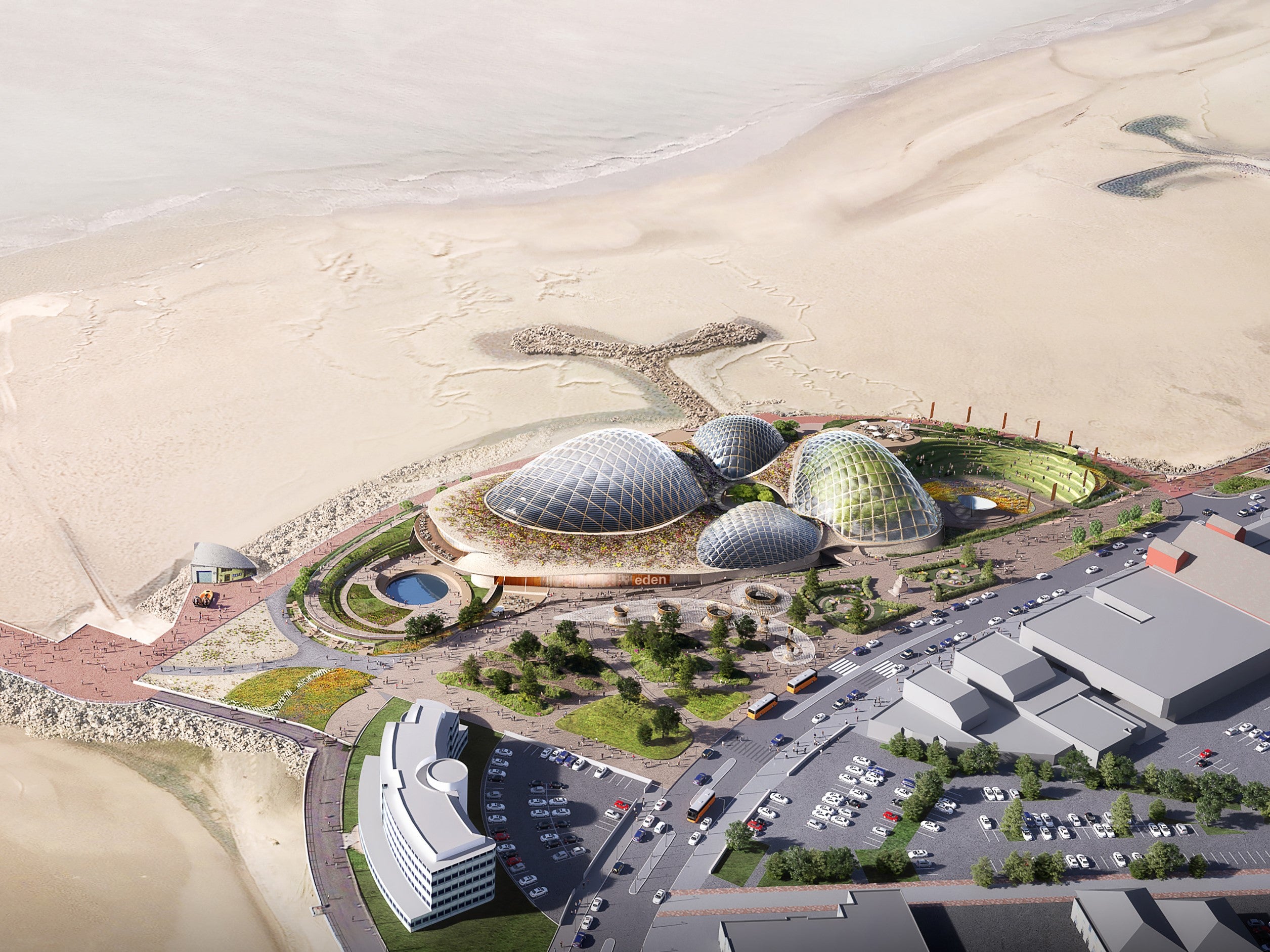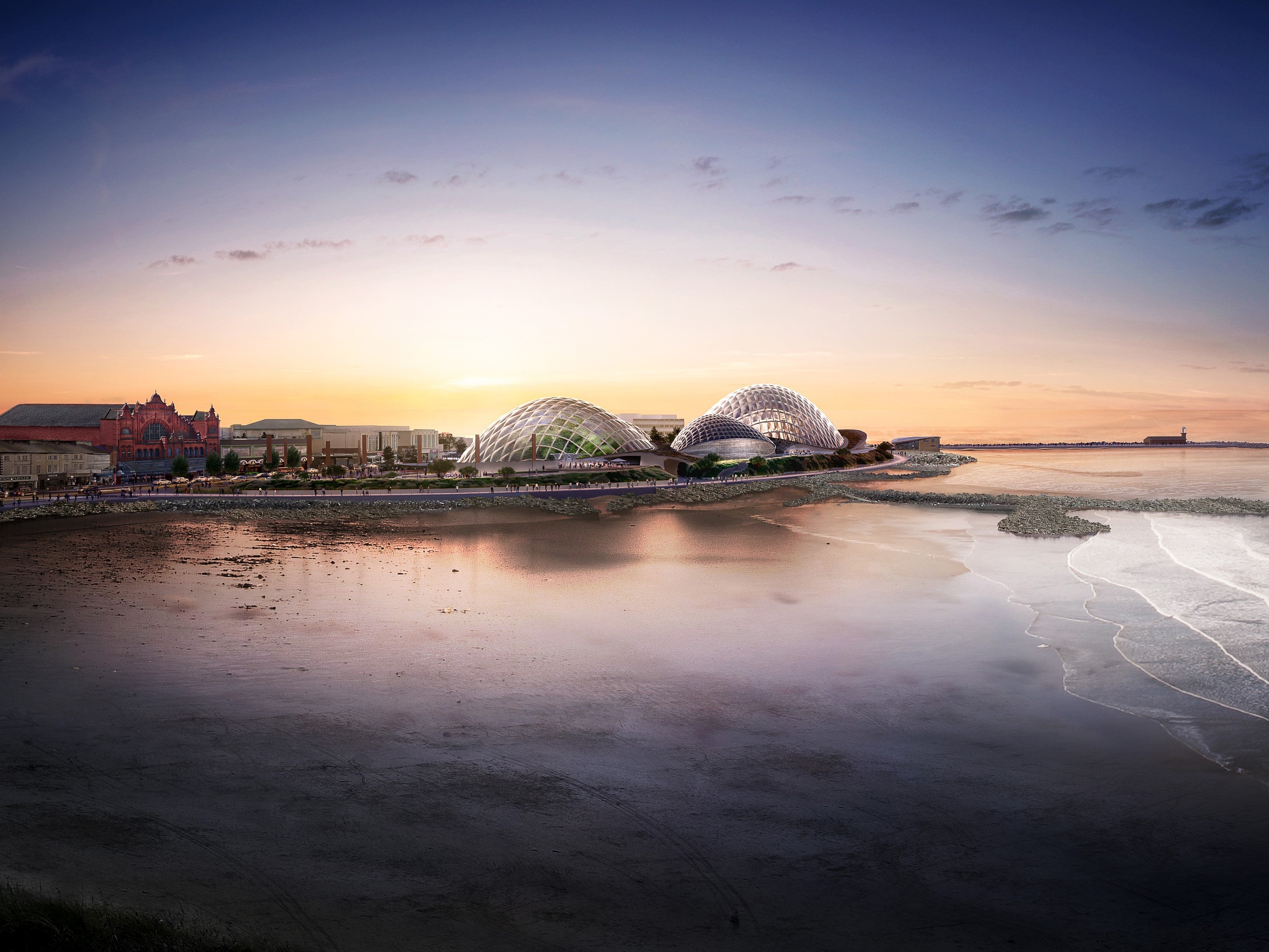Eden Project North to be built in Morecambe as seaside town approves £125m project
Attraction shaped by like four huge mussel shells expected to attract 760,000 people a year and generate £47m for local economy

Construction of a new £125m Eden Project North in the seaside town of Morecambe is set to begin later this year after major plans were approved by Lancaster City Council on Monday.
Four massive mussel-shaped domes and an outdoor amphitheatre will be built on derelict land at the Lancashire resort’s seafront as part of the extraordinary eco-tourist attraction.
Councillors unanimously green-lit the proposals during a planning committee meeting on Monday, saying it would help transform what is one of the UK’s most deprived coastal areas by bringing in more than 760,000 visitors every year and generating £47m annnually for the local economy. One councillor, Janice Hanson, called it a “fabulous” project.
Now, it is hoped the attraction – developed by the company behind the original Eden Project in Cornwall – will be opened in 2025.
David Harland, chief executive of Eden Project International, said: “It’s brilliant news. This is a bold vision for us and for Morecambe. We are creating an exempler for science and environmental tourism in the 21st century. And when people talk of levelling up, this is exactly what we are doing here.”
Although only £50m of the required £120m has so far been confirmed, the government has publicly backed the project and privately – sources suggest – said it would do whatever it took to make the project reality.
It is thought Michael Gove not only supports the project but sees the proposed domes as a highly visual potential symbol of the government’s commitment to levelling up the north.
“This would help transform Morecambe and the region’s fortunes for generations to come,” said Dame Sue Black, pro vice-chancellor for engagement at Lancaster University, one of several partners on the project.

Inside, the domes will feature immersive experiences, performance spaces and observatories inspired by the UK’s marine life but with a heavy focus on climate crisis education.
While tourism will be the main focus, partner organisations – that’s EPI and Lancaster University as well Lancaster City Council and Lancashire Council – say the attraction would also become a site of world-leading scientific research.
In an unusual move, there will be no car parking spaces at the attraction in an ambitious attempt to encourage visitors to use more sustainable transport. The building will harness its own solar and wave power with EPI hoping that it eventually creates more renewable energy than it uses.
Welcoming the approval, Caroline Jackson, leader of Lancaster City Council, called the development “the most significant project in our district for a generation”.
The Green Party councillor added: “ It will provide huge benefits to our economy through a commitment to local purchasing and creation of good local jobs, as well as shining a light on sustainable regeneration. The granting of planning permission is a major milestone in the project and all that remains now is for the government to show the same commitment and provide the necessary funding to make it a reality.”
Phillippa Williamson, the Conservative leader of Lancashire County Council, added: ““These are exciting times. The county council and the other partners remain focussed on securing the financial investment the project needs, so we can deliver Eden Project North for Morecambe, Lancashire and the region.”
It will be the second Eden Project in the UK, coming more than 20 years after the original opened in a disused claypit close to the town of St Blazey in Cornwall, in 2001.
In the 20 years since then, the building’s domes have become instantly recognisable across the world and generated some £2.2bn into the local economy.
Join our commenting forum
Join thought-provoking conversations, follow other Independent readers and see their replies
Comments
Bookmark popover
Removed from bookmarks